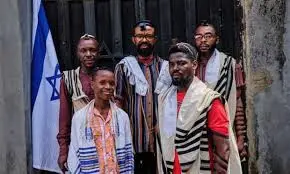Refuting the notion that Ndigbo Are Historical Jews.
The notion that the Ndigbo people of southeast Nigeria are derived from Israel’s lost tribes has sparked several discussions and conjectures. Proponents of this hypothesis believe that the Ndigbo and ancient Israelites share cultural conventions, linguistic features, and oral traditions. However, when factual, anthropological, and hereditary information is closely examined, these statements confront a number of challenges. This article presents academic analysis, hereditary research, and current material to refute the claim that the Ndigbo are predominantly Jewish.
1. Lack of Historical and Archaeological Evidence.
More crucial verifiable documentation or archaeological evidence is required to support the theory that ancient Israelites relocated to West Africa, namely to the area where the Ndigbo people live. Scientists who have focused on the experiences and relocations of West Africa have yet to find any evidence that Jewish populations became comfortable in southern Nigeria. The majority of the authentic review concentrates on the Ndigbo’s own political and social growth, which has grown independently of any Jewish ties, as well as their deep, indigenous roots in the Niger Waterway region. (Fage, J. D. (1978). A History of Africa. Routledge.)
2. Semantic Qualifications.
One of the most powerful arguments against the notion that the Ndigbo are genuine Jews is semantic proof. The Igbo language is found in the Volta-Niger region of the Niger-Congo family, which also includes a variety of West African languages. The Semitic language of the Afro-Asiatic language family is Hebrew, once again. The argument that the Ndigbo people are alienated from Jews is further undermined by etymologists’ inability to uncover any substantial similarities between Hebrew and the Igbo language.
Some Igbo words may sound similar to Hebrew ones; this can occasionally be attributed to a coincidence. Similitudes in etymological instances between dialects frequently occur naturally and do not always indicate a shared antecedent. Etymological coincidence, for example, has been noted in dialects that are accepted to be irrelevant to each other. (Blench, R. (2006). Archaeology, Language, and the African Past. Altamira Press.)
3. Conduct qualitative Research.
Continuous developments in hereditary attributes have provided specialists with a new way for examining the family foundations of various groups. The Ndigbo are not closely related to individuals of Jewish or Middle Eastern descent, but rather to other West African people groups, as heredity research on them has consistently demonstrated. For example, hereditary tests provided in scholarly journals such as Nature and PLOS Hereditary characteristics have allowed researchers to determine the normal African origins of Ndigbo and other West African identities.
Other ethnic groups with indigenous African roots, such as the Yoruba, Edo, and Efik, share inherited characteristics with the Ndigbo. These results demonstrate that the Ndigbo have deep origins in West Africa and refute the possibility that they slipped from Jews or individuals from the Middle East.
4. Cultural Context.
Defenders of the Ndigbo-Jewish hypothesis point to social practices such as ritual purification, food restrictions, and faith in a single God (monotheism), which they claim are akin to Jewish customs. In any event, a considerable number of these traditions are not exclusive to Judaism; they may be found in many African cultures in various forms. For example, the adoration of Olodumare in old Yoruba religion indicates monotheism, yet the Ndigbo have their own all-powerful god Chukwu. Overall, equitable social development has resulted in these shared qualities rather than historic Jewish rituals having an instant impact.
Furthermore, there has been a long-standing tale in African and African diaspora social hierarchies about the relationship between African ethnic groups and Israel’s lost clans. Similar pronouncements have been made regarding Ethiopia’s Beta Israel and the Southern African Lemba nation. The Lemba have demonstrated genetic markers that connect them to Jewish people groups, whereas the Ndigbo have found no evidence of these markers, implying that each group’s collection of experiences is distinct and not commonly connected with a Jewish origin.
5. Present-day developments and the Impact of Imperialism.
During the pilgrimage period, the possibility that the Ndigbo are verifiable Jews rose to prominence, and rigorous gatherings have continued to this day. In the late nineteenth and mid-twentieth centuries, Christian preachers postulated a relationship between the Ndigbo and Jews. To some extent, the goal of persuading locals to convert by demonstrating similarities between their customs and those of the Holy Book has failed. The belief that the Ndigbo are one of the lost clans of Israel has gained recognition all the more recently as a result of the Igbo Israelite Development, which formed in the late twentieth century and propagated the idea of the Ndigbo as one of the lost tribes of Israel. (Tishkoff, S. A., et al. (2009). “The Genetic Structure and History of Africans and African Americans,” Science.)
However intriguing, there is little significant factual, archeological, phonetic, or genetic evidence to support the hypothesis that the Ndigbo are genuine Jews. The Ndigbo public social tradition is multifaceted and deeply rooted in the West African climate. The staggering collection of insightful research demonstrates that the Ndigbo are a native African people with free history.

